Assessing Brexit: UK's WTO Agreement and Free Trade Advantages
VerifiedAdded on 2022/10/19
|8
|2759
|100
Report
AI Summary
This report provides a comprehensive analysis of the UK's trade agreements following the decision to leave the European Union. It assesses the advantages and disadvantages of the UK's integration with the EU under both the WTO agreement and a free trade agreement scenario. The analysis includes a discussion of the historical context, outlining the establishment of the EU and the UK's membership, as well as the 2016 Brexit referendum. The report examines the roles of the WTO and the EU in international trade, highlighting the benefits and drawbacks of each approach for the UK. It explores the economic and political implications of Brexit, considering factors such as trade, investment, and domestic policy. The report presents arguments for and against Brexit, drawing on relevant evidence and scholarly sources to support its conclusions. The analysis covers various aspects, including the impact on the UK's GDP, consumer prices, trade facilitation, and international relations. The report concludes by emphasizing the need for the UK government to develop a well-defined trade policy to navigate the post-Brexit landscape effectively.
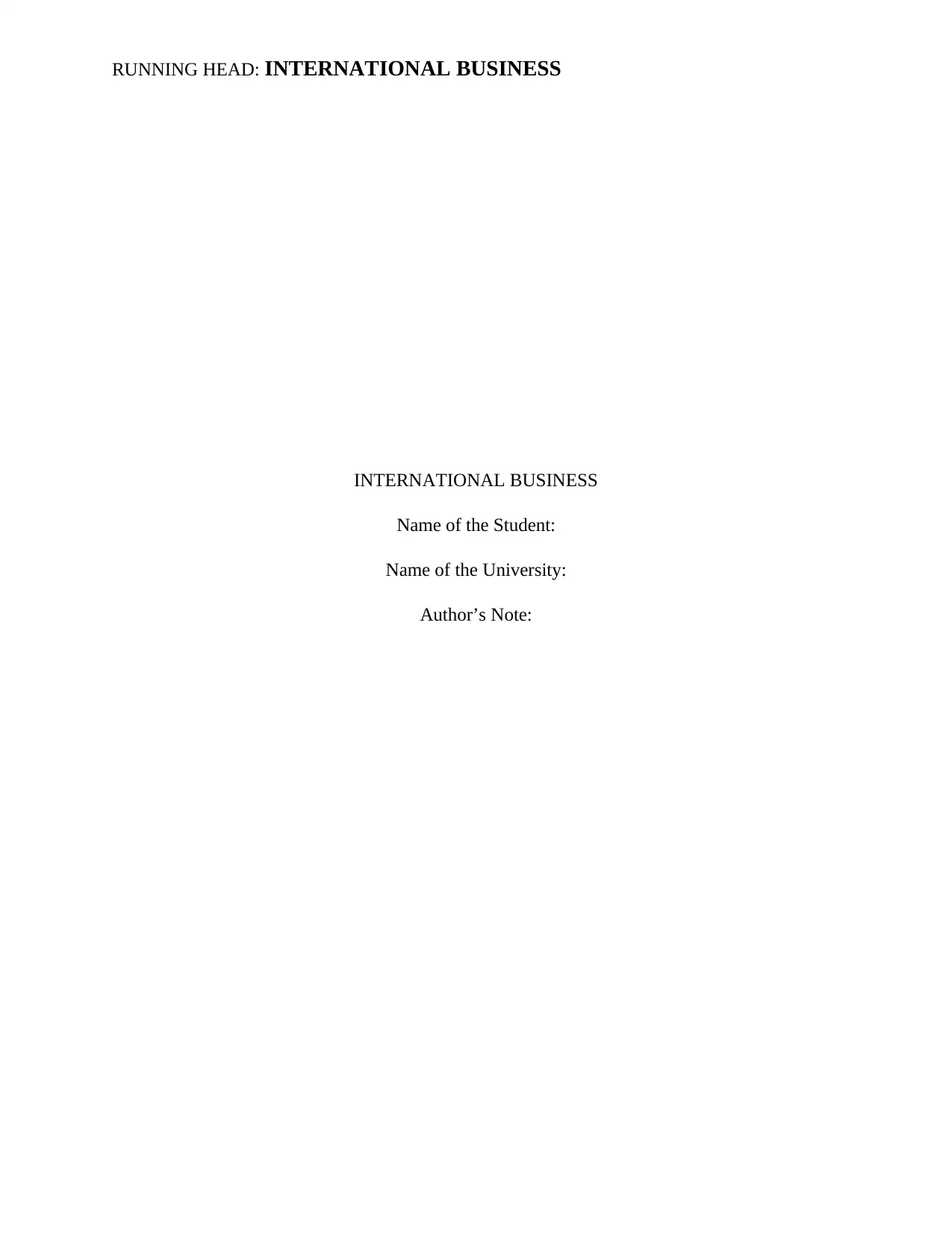
RUNNING HEAD: INTERNATIONAL BUSINESS
INTERNATIONAL BUSINESS
Name of the Student:
Name of the University:
Author’s Note:
INTERNATIONAL BUSINESS
Name of the Student:
Name of the University:
Author’s Note:
Paraphrase This Document
Need a fresh take? Get an instant paraphrase of this document with our AI Paraphraser
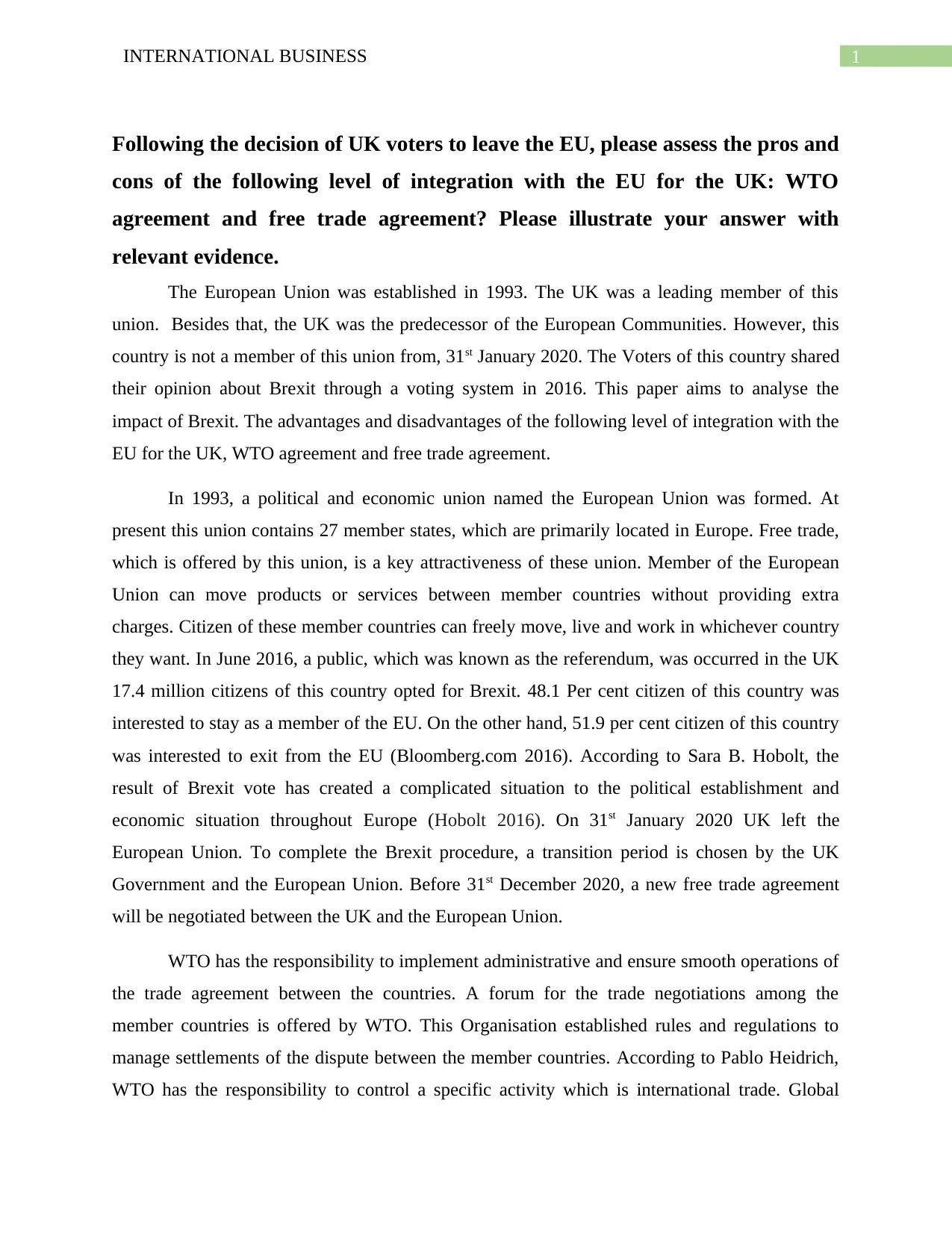
1INTERNATIONAL BUSINESS
Following the decision of UK voters to leave the EU, please assess the pros and
cons of the following level of integration with the EU for the UK: WTO
agreement and free trade agreement? Please illustrate your answer with
relevant evidence.
The European Union was established in 1993. The UK was a leading member of this
union. Besides that, the UK was the predecessor of the European Communities. However, this
country is not a member of this union from, 31st January 2020. The Voters of this country shared
their opinion about Brexit through a voting system in 2016. This paper aims to analyse the
impact of Brexit. The advantages and disadvantages of the following level of integration with the
EU for the UK, WTO agreement and free trade agreement.
In 1993, a political and economic union named the European Union was formed. At
present this union contains 27 member states, which are primarily located in Europe. Free trade,
which is offered by this union, is a key attractiveness of these union. Member of the European
Union can move products or services between member countries without providing extra
charges. Citizen of these member countries can freely move, live and work in whichever country
they want. In June 2016, a public, which was known as the referendum, was occurred in the UK
17.4 million citizens of this country opted for Brexit. 48.1 Per cent citizen of this country was
interested to stay as a member of the EU. On the other hand, 51.9 per cent citizen of this country
was interested to exit from the EU (Bloomberg.com 2016). According to Sara B. Hobolt, the
result of Brexit vote has created a complicated situation to the political establishment and
economic situation throughout Europe (Hobolt 2016). On 31st January 2020 UK left the
European Union. To complete the Brexit procedure, a transition period is chosen by the UK
Government and the European Union. Before 31st December 2020, a new free trade agreement
will be negotiated between the UK and the European Union.
WTO has the responsibility to implement administrative and ensure smooth operations of
the trade agreement between the countries. A forum for the trade negotiations among the
member countries is offered by WTO. This Organisation established rules and regulations to
manage settlements of the dispute between the member countries. According to Pablo Heidrich,
WTO has the responsibility to control a specific activity which is international trade. Global
Following the decision of UK voters to leave the EU, please assess the pros and
cons of the following level of integration with the EU for the UK: WTO
agreement and free trade agreement? Please illustrate your answer with
relevant evidence.
The European Union was established in 1993. The UK was a leading member of this
union. Besides that, the UK was the predecessor of the European Communities. However, this
country is not a member of this union from, 31st January 2020. The Voters of this country shared
their opinion about Brexit through a voting system in 2016. This paper aims to analyse the
impact of Brexit. The advantages and disadvantages of the following level of integration with the
EU for the UK, WTO agreement and free trade agreement.
In 1993, a political and economic union named the European Union was formed. At
present this union contains 27 member states, which are primarily located in Europe. Free trade,
which is offered by this union, is a key attractiveness of these union. Member of the European
Union can move products or services between member countries without providing extra
charges. Citizen of these member countries can freely move, live and work in whichever country
they want. In June 2016, a public, which was known as the referendum, was occurred in the UK
17.4 million citizens of this country opted for Brexit. 48.1 Per cent citizen of this country was
interested to stay as a member of the EU. On the other hand, 51.9 per cent citizen of this country
was interested to exit from the EU (Bloomberg.com 2016). According to Sara B. Hobolt, the
result of Brexit vote has created a complicated situation to the political establishment and
economic situation throughout Europe (Hobolt 2016). On 31st January 2020 UK left the
European Union. To complete the Brexit procedure, a transition period is chosen by the UK
Government and the European Union. Before 31st December 2020, a new free trade agreement
will be negotiated between the UK and the European Union.
WTO has the responsibility to implement administrative and ensure smooth operations of
the trade agreement between the countries. A forum for the trade negotiations among the
member countries is offered by WTO. This Organisation established rules and regulations to
manage settlements of the dispute between the member countries. According to Pablo Heidrich,
WTO has the responsibility to control a specific activity which is international trade. Global
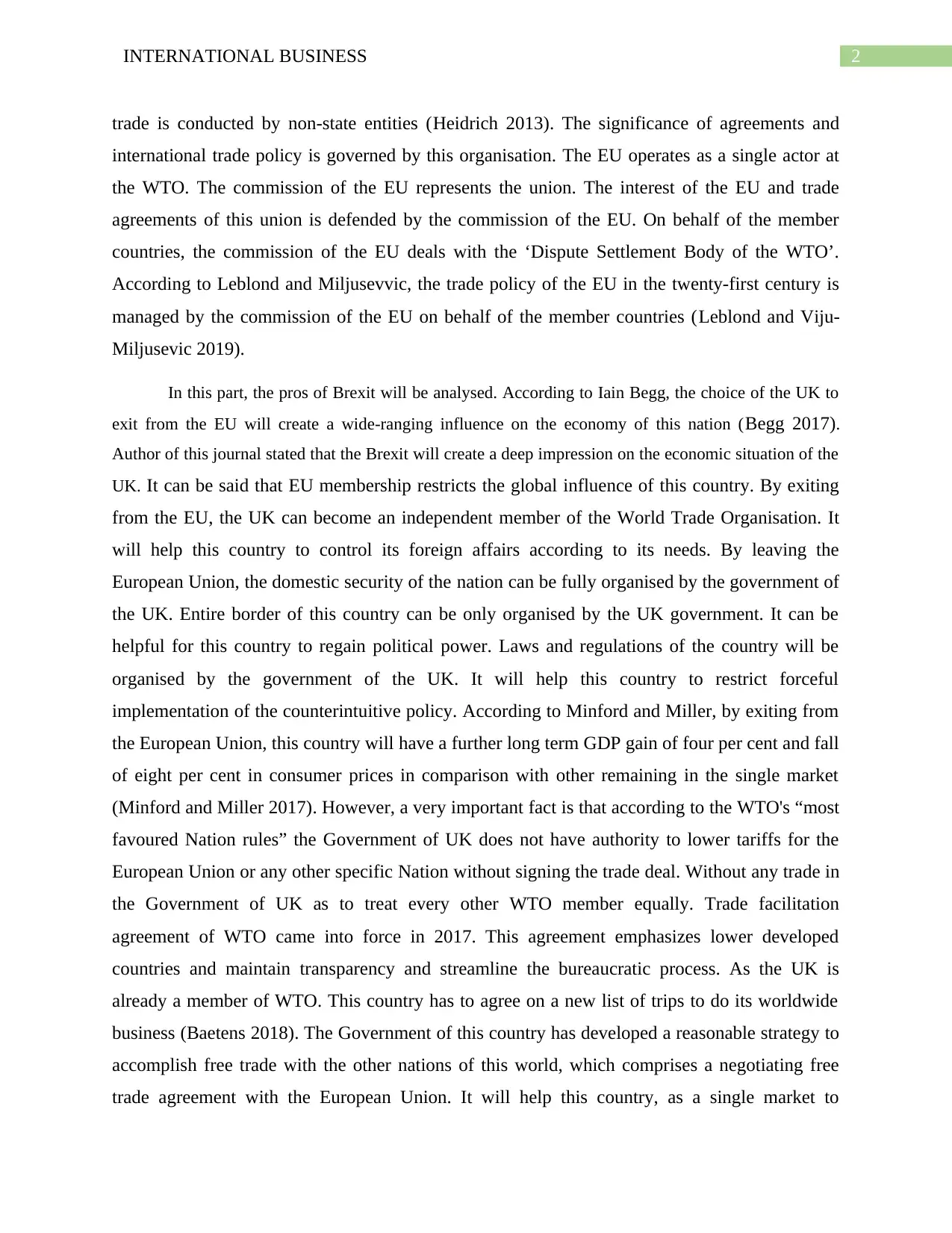
2INTERNATIONAL BUSINESS
trade is conducted by non-state entities (Heidrich 2013). The significance of agreements and
international trade policy is governed by this organisation. The EU operates as a single actor at
the WTO. The commission of the EU represents the union. The interest of the EU and trade
agreements of this union is defended by the commission of the EU. On behalf of the member
countries, the commission of the EU deals with the ‘Dispute Settlement Body of the WTO’.
According to Leblond and Miljusevvic, the trade policy of the EU in the twenty-first century is
managed by the commission of the EU on behalf of the member countries (Leblond and Viju-
Miljusevic 2019).
In this part, the pros of Brexit will be analysed. According to Iain Begg, the choice of the UK to
exit from the EU will create a wide-ranging influence on the economy of this nation (Begg 2017).
Author of this journal stated that the Brexit will create a deep impression on the economic situation of the
UK. It can be said that EU membership restricts the global influence of this country. By exiting
from the EU, the UK can become an independent member of the World Trade Organisation. It
will help this country to control its foreign affairs according to its needs. By leaving the
European Union, the domestic security of the nation can be fully organised by the government of
the UK. Entire border of this country can be only organised by the UK government. It can be
helpful for this country to regain political power. Laws and regulations of the country will be
organised by the government of the UK. It will help this country to restrict forceful
implementation of the counterintuitive policy. According to Minford and Miller, by exiting from
the European Union, this country will have a further long term GDP gain of four per cent and fall
of eight per cent in consumer prices in comparison with other remaining in the single market
(Minford and Miller 2017). However, a very important fact is that according to the WTO's “most
favoured Nation rules” the Government of UK does not have authority to lower tariffs for the
European Union or any other specific Nation without signing the trade deal. Without any trade in
the Government of UK as to treat every other WTO member equally. Trade facilitation
agreement of WTO came into force in 2017. This agreement emphasizes lower developed
countries and maintain transparency and streamline the bureaucratic process. As the UK is
already a member of WTO. This country has to agree on a new list of trips to do its worldwide
business (Baetens 2018). The Government of this country has developed a reasonable strategy to
accomplish free trade with the other nations of this world, which comprises a negotiating free
trade agreement with the European Union. It will help this country, as a single market to
trade is conducted by non-state entities (Heidrich 2013). The significance of agreements and
international trade policy is governed by this organisation. The EU operates as a single actor at
the WTO. The commission of the EU represents the union. The interest of the EU and trade
agreements of this union is defended by the commission of the EU. On behalf of the member
countries, the commission of the EU deals with the ‘Dispute Settlement Body of the WTO’.
According to Leblond and Miljusevvic, the trade policy of the EU in the twenty-first century is
managed by the commission of the EU on behalf of the member countries (Leblond and Viju-
Miljusevic 2019).
In this part, the pros of Brexit will be analysed. According to Iain Begg, the choice of the UK to
exit from the EU will create a wide-ranging influence on the economy of this nation (Begg 2017).
Author of this journal stated that the Brexit will create a deep impression on the economic situation of the
UK. It can be said that EU membership restricts the global influence of this country. By exiting
from the EU, the UK can become an independent member of the World Trade Organisation. It
will help this country to control its foreign affairs according to its needs. By leaving the
European Union, the domestic security of the nation can be fully organised by the government of
the UK. Entire border of this country can be only organised by the UK government. It can be
helpful for this country to regain political power. Laws and regulations of the country will be
organised by the government of the UK. It will help this country to restrict forceful
implementation of the counterintuitive policy. According to Minford and Miller, by exiting from
the European Union, this country will have a further long term GDP gain of four per cent and fall
of eight per cent in consumer prices in comparison with other remaining in the single market
(Minford and Miller 2017). However, a very important fact is that according to the WTO's “most
favoured Nation rules” the Government of UK does not have authority to lower tariffs for the
European Union or any other specific Nation without signing the trade deal. Without any trade in
the Government of UK as to treat every other WTO member equally. Trade facilitation
agreement of WTO came into force in 2017. This agreement emphasizes lower developed
countries and maintain transparency and streamline the bureaucratic process. As the UK is
already a member of WTO. This country has to agree on a new list of trips to do its worldwide
business (Baetens 2018). The Government of this country has developed a reasonable strategy to
accomplish free trade with the other nations of this world, which comprises a negotiating free
trade agreement with the European Union. It will help this country, as a single market to
⊘ This is a preview!⊘
Do you want full access?
Subscribe today to unlock all pages.

Trusted by 1+ million students worldwide
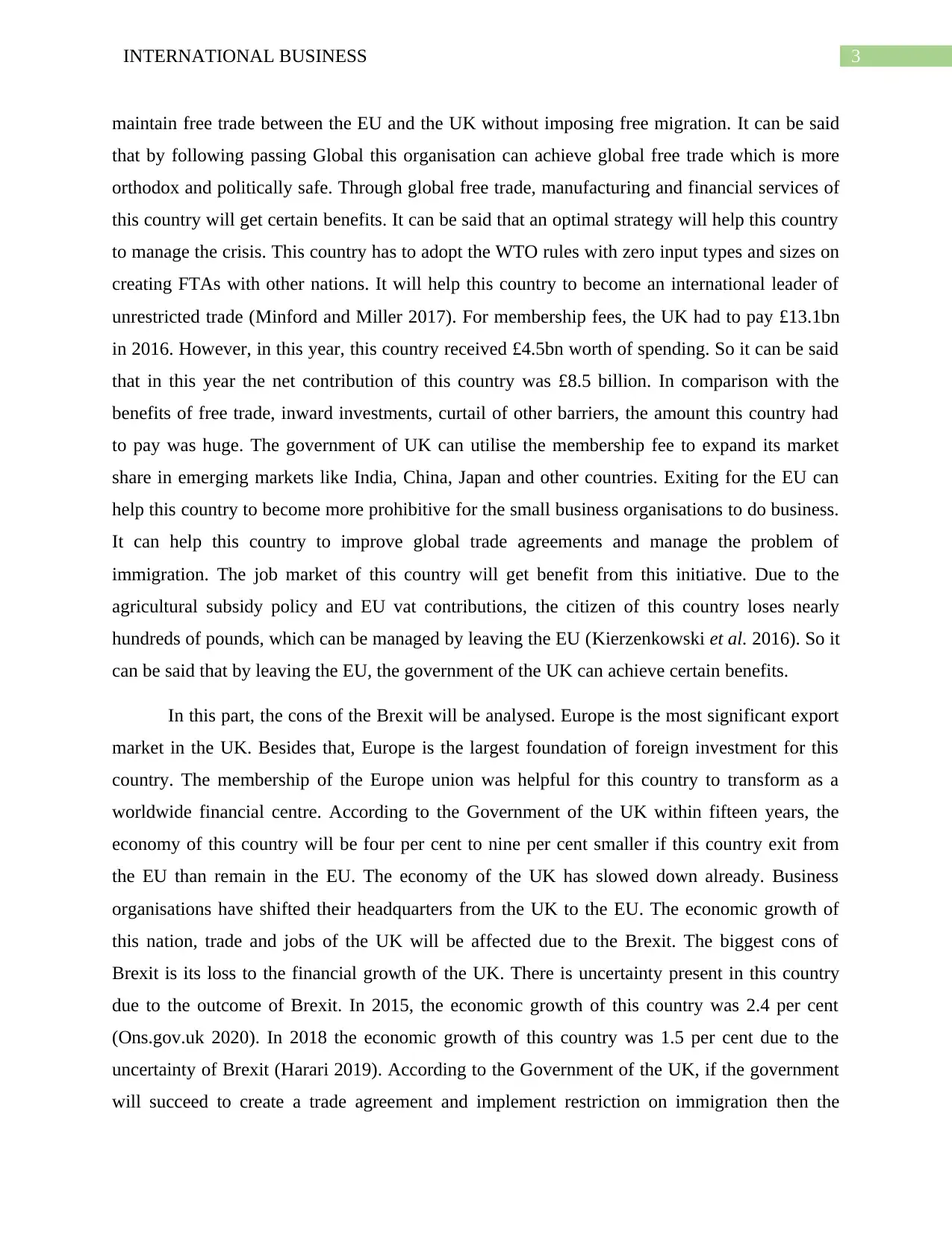
3INTERNATIONAL BUSINESS
maintain free trade between the EU and the UK without imposing free migration. It can be said
that by following passing Global this organisation can achieve global free trade which is more
orthodox and politically safe. Through global free trade, manufacturing and financial services of
this country will get certain benefits. It can be said that an optimal strategy will help this country
to manage the crisis. This country has to adopt the WTO rules with zero input types and sizes on
creating FTAs with other nations. It will help this country to become an international leader of
unrestricted trade (Minford and Miller 2017). For membership fees, the UK had to pay £13.1bn
in 2016. However, in this year, this country received £4.5bn worth of spending. So it can be said
that in this year the net contribution of this country was £8.5 billion. In comparison with the
benefits of free trade, inward investments, curtail of other barriers, the amount this country had
to pay was huge. The government of UK can utilise the membership fee to expand its market
share in emerging markets like India, China, Japan and other countries. Exiting for the EU can
help this country to become more prohibitive for the small business organisations to do business.
It can help this country to improve global trade agreements and manage the problem of
immigration. The job market of this country will get benefit from this initiative. Due to the
agricultural subsidy policy and EU vat contributions, the citizen of this country loses nearly
hundreds of pounds, which can be managed by leaving the EU (Kierzenkowski et al. 2016). So it
can be said that by leaving the EU, the government of the UK can achieve certain benefits.
In this part, the cons of the Brexit will be analysed. Europe is the most significant export
market in the UK. Besides that, Europe is the largest foundation of foreign investment for this
country. The membership of the Europe union was helpful for this country to transform as a
worldwide financial centre. According to the Government of the UK within fifteen years, the
economy of this country will be four per cent to nine per cent smaller if this country exit from
the EU than remain in the EU. The economy of the UK has slowed down already. Business
organisations have shifted their headquarters from the UK to the EU. The economic growth of
this nation, trade and jobs of the UK will be affected due to the Brexit. The biggest cons of
Brexit is its loss to the financial growth of the UK. There is uncertainty present in this country
due to the outcome of Brexit. In 2015, the economic growth of this country was 2.4 per cent
(Ons.gov.uk 2020). In 2018 the economic growth of this country was 1.5 per cent due to the
uncertainty of Brexit (Harari 2019). According to the Government of the UK, if the government
will succeed to create a trade agreement and implement restriction on immigration then the
maintain free trade between the EU and the UK without imposing free migration. It can be said
that by following passing Global this organisation can achieve global free trade which is more
orthodox and politically safe. Through global free trade, manufacturing and financial services of
this country will get certain benefits. It can be said that an optimal strategy will help this country
to manage the crisis. This country has to adopt the WTO rules with zero input types and sizes on
creating FTAs with other nations. It will help this country to become an international leader of
unrestricted trade (Minford and Miller 2017). For membership fees, the UK had to pay £13.1bn
in 2016. However, in this year, this country received £4.5bn worth of spending. So it can be said
that in this year the net contribution of this country was £8.5 billion. In comparison with the
benefits of free trade, inward investments, curtail of other barriers, the amount this country had
to pay was huge. The government of UK can utilise the membership fee to expand its market
share in emerging markets like India, China, Japan and other countries. Exiting for the EU can
help this country to become more prohibitive for the small business organisations to do business.
It can help this country to improve global trade agreements and manage the problem of
immigration. The job market of this country will get benefit from this initiative. Due to the
agricultural subsidy policy and EU vat contributions, the citizen of this country loses nearly
hundreds of pounds, which can be managed by leaving the EU (Kierzenkowski et al. 2016). So it
can be said that by leaving the EU, the government of the UK can achieve certain benefits.
In this part, the cons of the Brexit will be analysed. Europe is the most significant export
market in the UK. Besides that, Europe is the largest foundation of foreign investment for this
country. The membership of the Europe union was helpful for this country to transform as a
worldwide financial centre. According to the Government of the UK within fifteen years, the
economy of this country will be four per cent to nine per cent smaller if this country exit from
the EU than remain in the EU. The economy of the UK has slowed down already. Business
organisations have shifted their headquarters from the UK to the EU. The economic growth of
this nation, trade and jobs of the UK will be affected due to the Brexit. The biggest cons of
Brexit is its loss to the financial growth of the UK. There is uncertainty present in this country
due to the outcome of Brexit. In 2015, the economic growth of this country was 2.4 per cent
(Ons.gov.uk 2020). In 2018 the economic growth of this country was 1.5 per cent due to the
uncertainty of Brexit (Harari 2019). According to the Government of the UK, if the government
will succeed to create a trade agreement and implement restriction on immigration then the
Paraphrase This Document
Need a fresh take? Get an instant paraphrase of this document with our AI Paraphraser
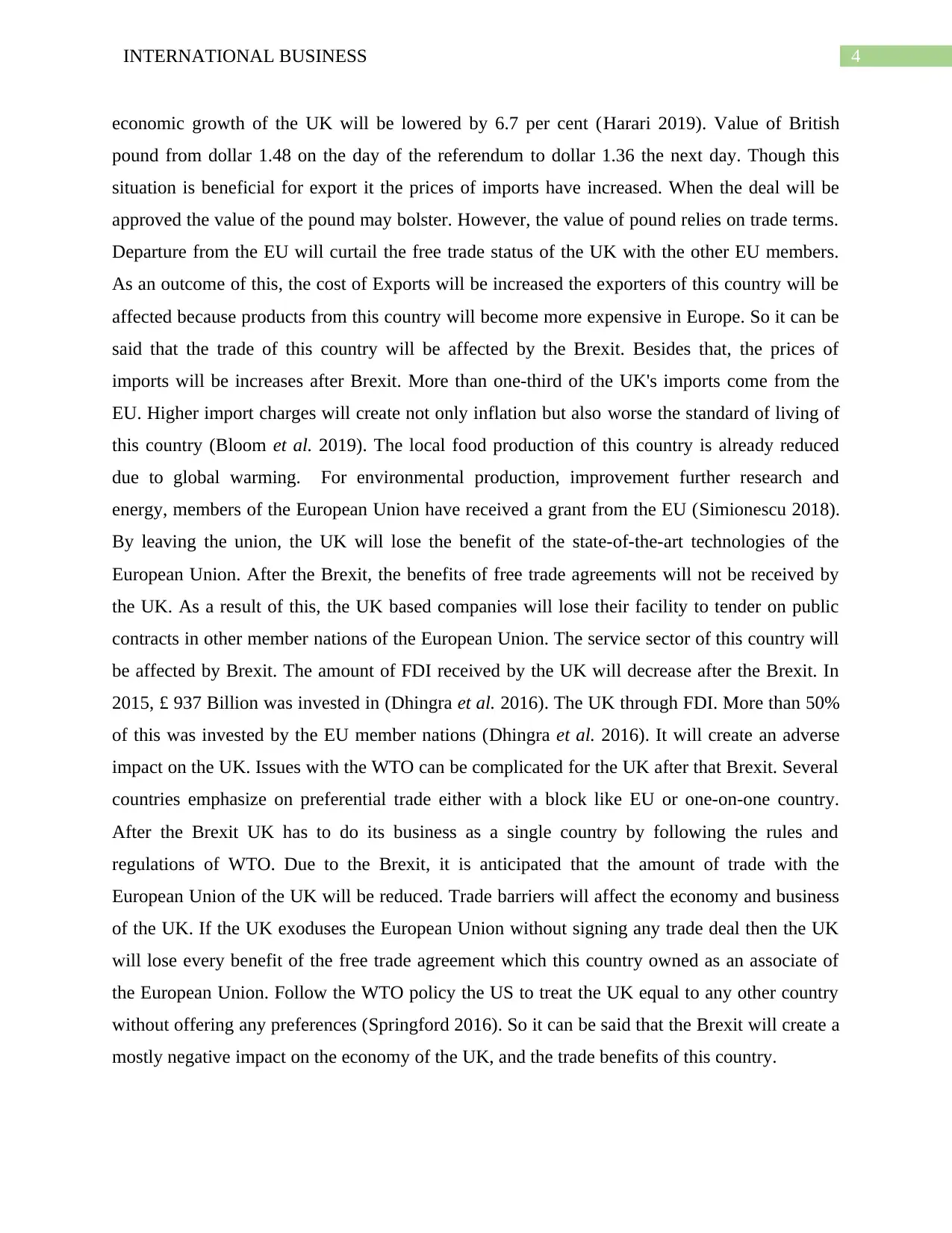
4INTERNATIONAL BUSINESS
economic growth of the UK will be lowered by 6.7 per cent (Harari 2019). Value of British
pound from dollar 1.48 on the day of the referendum to dollar 1.36 the next day. Though this
situation is beneficial for export it the prices of imports have increased. When the deal will be
approved the value of the pound may bolster. However, the value of pound relies on trade terms.
Departure from the EU will curtail the free trade status of the UK with the other EU members.
As an outcome of this, the cost of Exports will be increased the exporters of this country will be
affected because products from this country will become more expensive in Europe. So it can be
said that the trade of this country will be affected by the Brexit. Besides that, the prices of
imports will be increases after Brexit. More than one-third of the UK's imports come from the
EU. Higher import charges will create not only inflation but also worse the standard of living of
this country (Bloom et al. 2019). The local food production of this country is already reduced
due to global warming. For environmental production, improvement further research and
energy, members of the European Union have received a grant from the EU (Simionescu 2018).
By leaving the union, the UK will lose the benefit of the state-of-the-art technologies of the
European Union. After the Brexit, the benefits of free trade agreements will not be received by
the UK. As a result of this, the UK based companies will lose their facility to tender on public
contracts in other member nations of the European Union. The service sector of this country will
be affected by Brexit. The amount of FDI received by the UK will decrease after the Brexit. In
2015, £ 937 Billion was invested in (Dhingra et al. 2016). The UK through FDI. More than 50%
of this was invested by the EU member nations (Dhingra et al. 2016). It will create an adverse
impact on the UK. Issues with the WTO can be complicated for the UK after that Brexit. Several
countries emphasize on preferential trade either with a block like EU or one-on-one country.
After the Brexit UK has to do its business as a single country by following the rules and
regulations of WTO. Due to the Brexit, it is anticipated that the amount of trade with the
European Union of the UK will be reduced. Trade barriers will affect the economy and business
of the UK. If the UK exoduses the European Union without signing any trade deal then the UK
will lose every benefit of the free trade agreement which this country owned as an associate of
the European Union. Follow the WTO policy the US to treat the UK equal to any other country
without offering any preferences (Springford 2016). So it can be said that the Brexit will create a
mostly negative impact on the economy of the UK, and the trade benefits of this country.
economic growth of the UK will be lowered by 6.7 per cent (Harari 2019). Value of British
pound from dollar 1.48 on the day of the referendum to dollar 1.36 the next day. Though this
situation is beneficial for export it the prices of imports have increased. When the deal will be
approved the value of the pound may bolster. However, the value of pound relies on trade terms.
Departure from the EU will curtail the free trade status of the UK with the other EU members.
As an outcome of this, the cost of Exports will be increased the exporters of this country will be
affected because products from this country will become more expensive in Europe. So it can be
said that the trade of this country will be affected by the Brexit. Besides that, the prices of
imports will be increases after Brexit. More than one-third of the UK's imports come from the
EU. Higher import charges will create not only inflation but also worse the standard of living of
this country (Bloom et al. 2019). The local food production of this country is already reduced
due to global warming. For environmental production, improvement further research and
energy, members of the European Union have received a grant from the EU (Simionescu 2018).
By leaving the union, the UK will lose the benefit of the state-of-the-art technologies of the
European Union. After the Brexit, the benefits of free trade agreements will not be received by
the UK. As a result of this, the UK based companies will lose their facility to tender on public
contracts in other member nations of the European Union. The service sector of this country will
be affected by Brexit. The amount of FDI received by the UK will decrease after the Brexit. In
2015, £ 937 Billion was invested in (Dhingra et al. 2016). The UK through FDI. More than 50%
of this was invested by the EU member nations (Dhingra et al. 2016). It will create an adverse
impact on the UK. Issues with the WTO can be complicated for the UK after that Brexit. Several
countries emphasize on preferential trade either with a block like EU or one-on-one country.
After the Brexit UK has to do its business as a single country by following the rules and
regulations of WTO. Due to the Brexit, it is anticipated that the amount of trade with the
European Union of the UK will be reduced. Trade barriers will affect the economy and business
of the UK. If the UK exoduses the European Union without signing any trade deal then the UK
will lose every benefit of the free trade agreement which this country owned as an associate of
the European Union. Follow the WTO policy the US to treat the UK equal to any other country
without offering any preferences (Springford 2016). So it can be said that the Brexit will create a
mostly negative impact on the economy of the UK, and the trade benefits of this country.
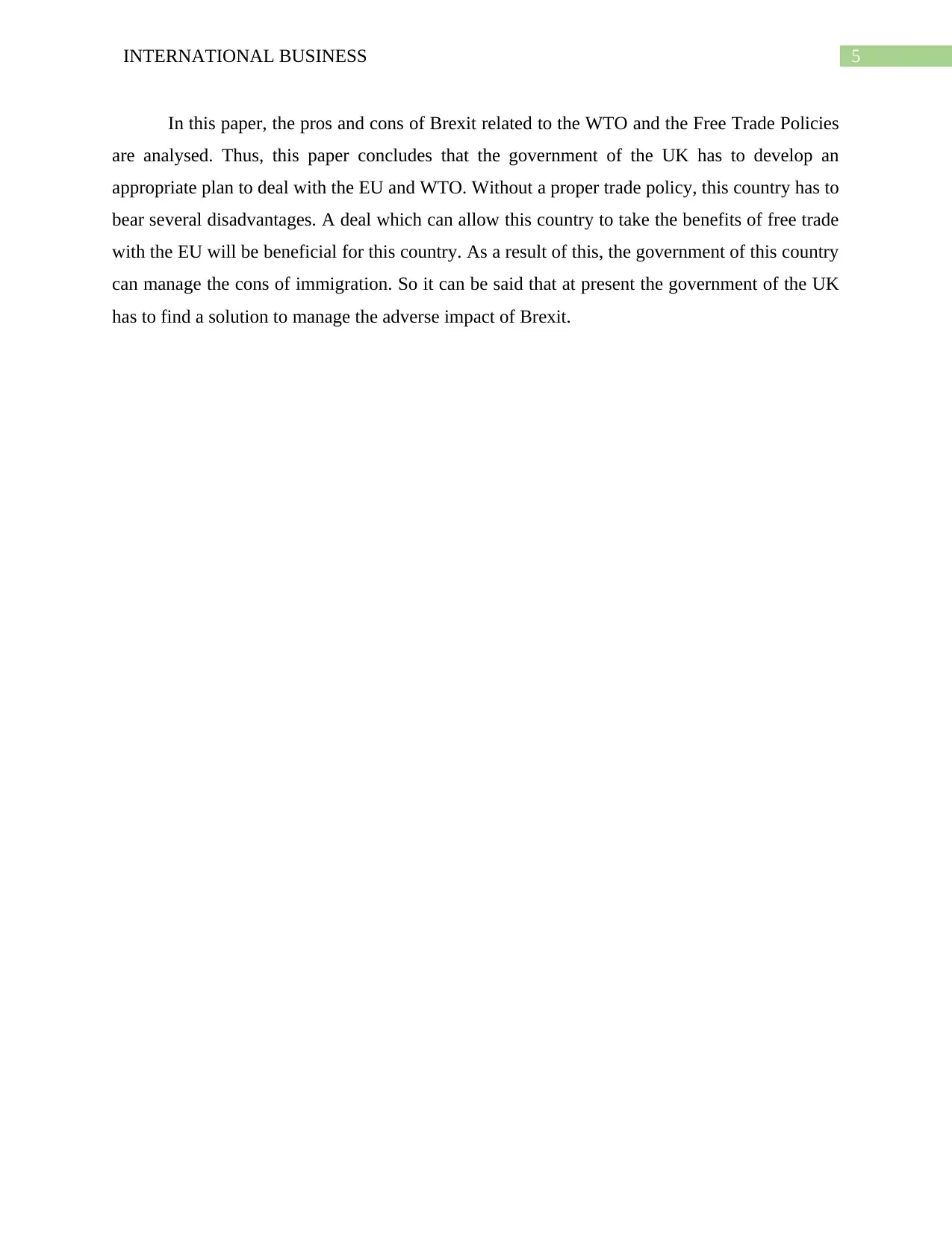
5INTERNATIONAL BUSINESS
In this paper, the pros and cons of Brexit related to the WTO and the Free Trade Policies
are analysed. Thus, this paper concludes that the government of the UK has to develop an
appropriate plan to deal with the EU and WTO. Without a proper trade policy, this country has to
bear several disadvantages. A deal which can allow this country to take the benefits of free trade
with the EU will be beneficial for this country. As a result of this, the government of this country
can manage the cons of immigration. So it can be said that at present the government of the UK
has to find a solution to manage the adverse impact of Brexit.
In this paper, the pros and cons of Brexit related to the WTO and the Free Trade Policies
are analysed. Thus, this paper concludes that the government of the UK has to develop an
appropriate plan to deal with the EU and WTO. Without a proper trade policy, this country has to
bear several disadvantages. A deal which can allow this country to take the benefits of free trade
with the EU will be beneficial for this country. As a result of this, the government of this country
can manage the cons of immigration. So it can be said that at present the government of the UK
has to find a solution to manage the adverse impact of Brexit.
⊘ This is a preview!⊘
Do you want full access?
Subscribe today to unlock all pages.

Trusted by 1+ million students worldwide
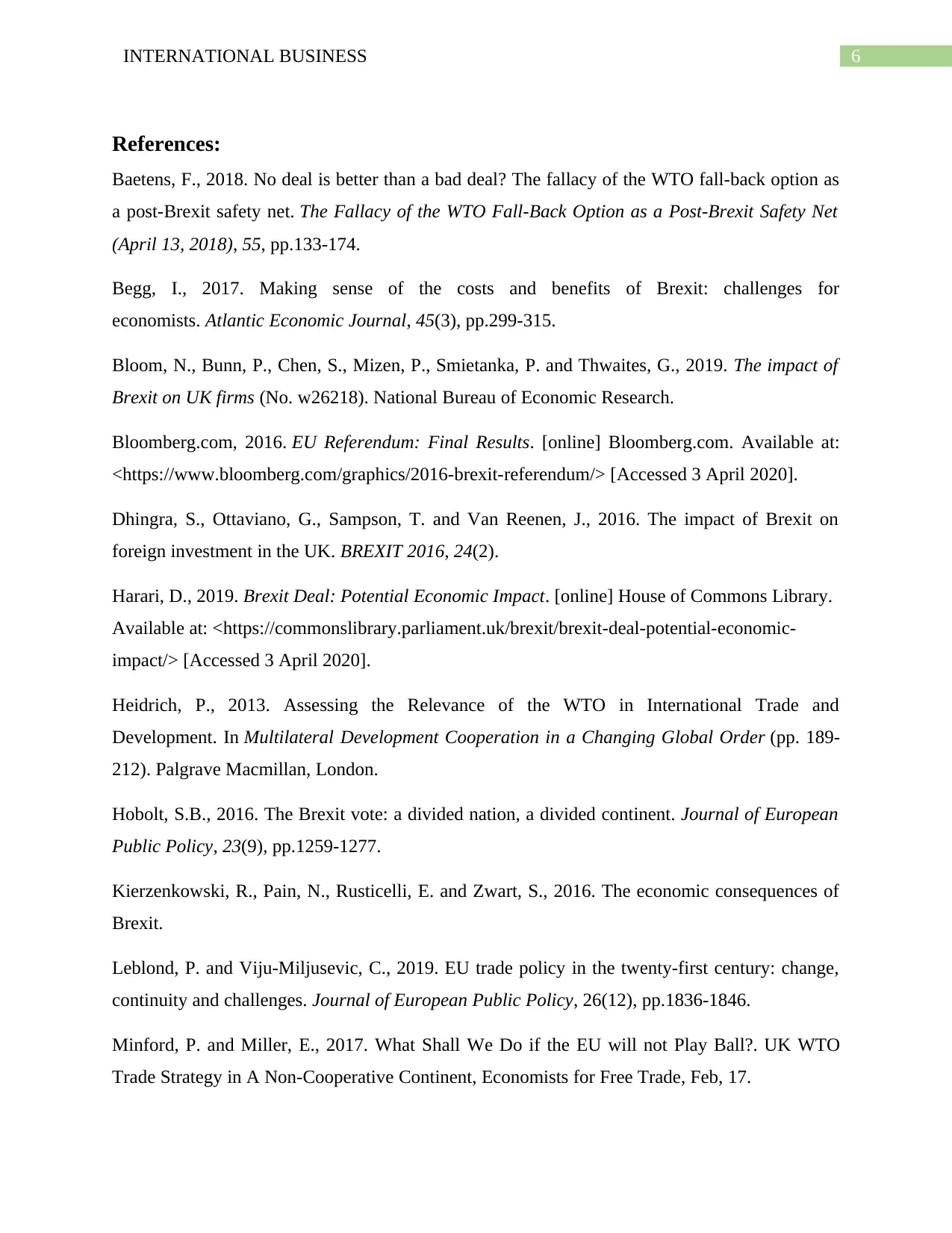
6INTERNATIONAL BUSINESS
References:
Baetens, F., 2018. No deal is better than a bad deal? The fallacy of the WTO fall-back option as
a post-Brexit safety net. The Fallacy of the WTO Fall-Back Option as a Post-Brexit Safety Net
(April 13, 2018), 55, pp.133-174.
Begg, I., 2017. Making sense of the costs and benefits of Brexit: challenges for
economists. Atlantic Economic Journal, 45(3), pp.299-315.
Bloom, N., Bunn, P., Chen, S., Mizen, P., Smietanka, P. and Thwaites, G., 2019. The impact of
Brexit on UK firms (No. w26218). National Bureau of Economic Research.
Bloomberg.com, 2016. EU Referendum: Final Results. [online] Bloomberg.com. Available at:
<https://www.bloomberg.com/graphics/2016-brexit-referendum/> [Accessed 3 April 2020].
Dhingra, S., Ottaviano, G., Sampson, T. and Van Reenen, J., 2016. The impact of Brexit on
foreign investment in the UK. BREXIT 2016, 24(2).
Harari, D., 2019. Brexit Deal: Potential Economic Impact. [online] House of Commons Library.
Available at: <https://commonslibrary.parliament.uk/brexit/brexit-deal-potential-economic-
impact/> [Accessed 3 April 2020].
Heidrich, P., 2013. Assessing the Relevance of the WTO in International Trade and
Development. In Multilateral Development Cooperation in a Changing Global Order (pp. 189-
212). Palgrave Macmillan, London.
Hobolt, S.B., 2016. The Brexit vote: a divided nation, a divided continent. Journal of European
Public Policy, 23(9), pp.1259-1277.
Kierzenkowski, R., Pain, N., Rusticelli, E. and Zwart, S., 2016. The economic consequences of
Brexit.
Leblond, P. and Viju-Miljusevic, C., 2019. EU trade policy in the twenty-first century: change,
continuity and challenges. Journal of European Public Policy, 26(12), pp.1836-1846.
Minford, P. and Miller, E., 2017. What Shall We Do if the EU will not Play Ball?. UK WTO
Trade Strategy in A Non-Cooperative Continent, Economists for Free Trade, Feb, 17.
References:
Baetens, F., 2018. No deal is better than a bad deal? The fallacy of the WTO fall-back option as
a post-Brexit safety net. The Fallacy of the WTO Fall-Back Option as a Post-Brexit Safety Net
(April 13, 2018), 55, pp.133-174.
Begg, I., 2017. Making sense of the costs and benefits of Brexit: challenges for
economists. Atlantic Economic Journal, 45(3), pp.299-315.
Bloom, N., Bunn, P., Chen, S., Mizen, P., Smietanka, P. and Thwaites, G., 2019. The impact of
Brexit on UK firms (No. w26218). National Bureau of Economic Research.
Bloomberg.com, 2016. EU Referendum: Final Results. [online] Bloomberg.com. Available at:
<https://www.bloomberg.com/graphics/2016-brexit-referendum/> [Accessed 3 April 2020].
Dhingra, S., Ottaviano, G., Sampson, T. and Van Reenen, J., 2016. The impact of Brexit on
foreign investment in the UK. BREXIT 2016, 24(2).
Harari, D., 2019. Brexit Deal: Potential Economic Impact. [online] House of Commons Library.
Available at: <https://commonslibrary.parliament.uk/brexit/brexit-deal-potential-economic-
impact/> [Accessed 3 April 2020].
Heidrich, P., 2013. Assessing the Relevance of the WTO in International Trade and
Development. In Multilateral Development Cooperation in a Changing Global Order (pp. 189-
212). Palgrave Macmillan, London.
Hobolt, S.B., 2016. The Brexit vote: a divided nation, a divided continent. Journal of European
Public Policy, 23(9), pp.1259-1277.
Kierzenkowski, R., Pain, N., Rusticelli, E. and Zwart, S., 2016. The economic consequences of
Brexit.
Leblond, P. and Viju-Miljusevic, C., 2019. EU trade policy in the twenty-first century: change,
continuity and challenges. Journal of European Public Policy, 26(12), pp.1836-1846.
Minford, P. and Miller, E., 2017. What Shall We Do if the EU will not Play Ball?. UK WTO
Trade Strategy in A Non-Cooperative Continent, Economists for Free Trade, Feb, 17.
Paraphrase This Document
Need a fresh take? Get an instant paraphrase of this document with our AI Paraphraser
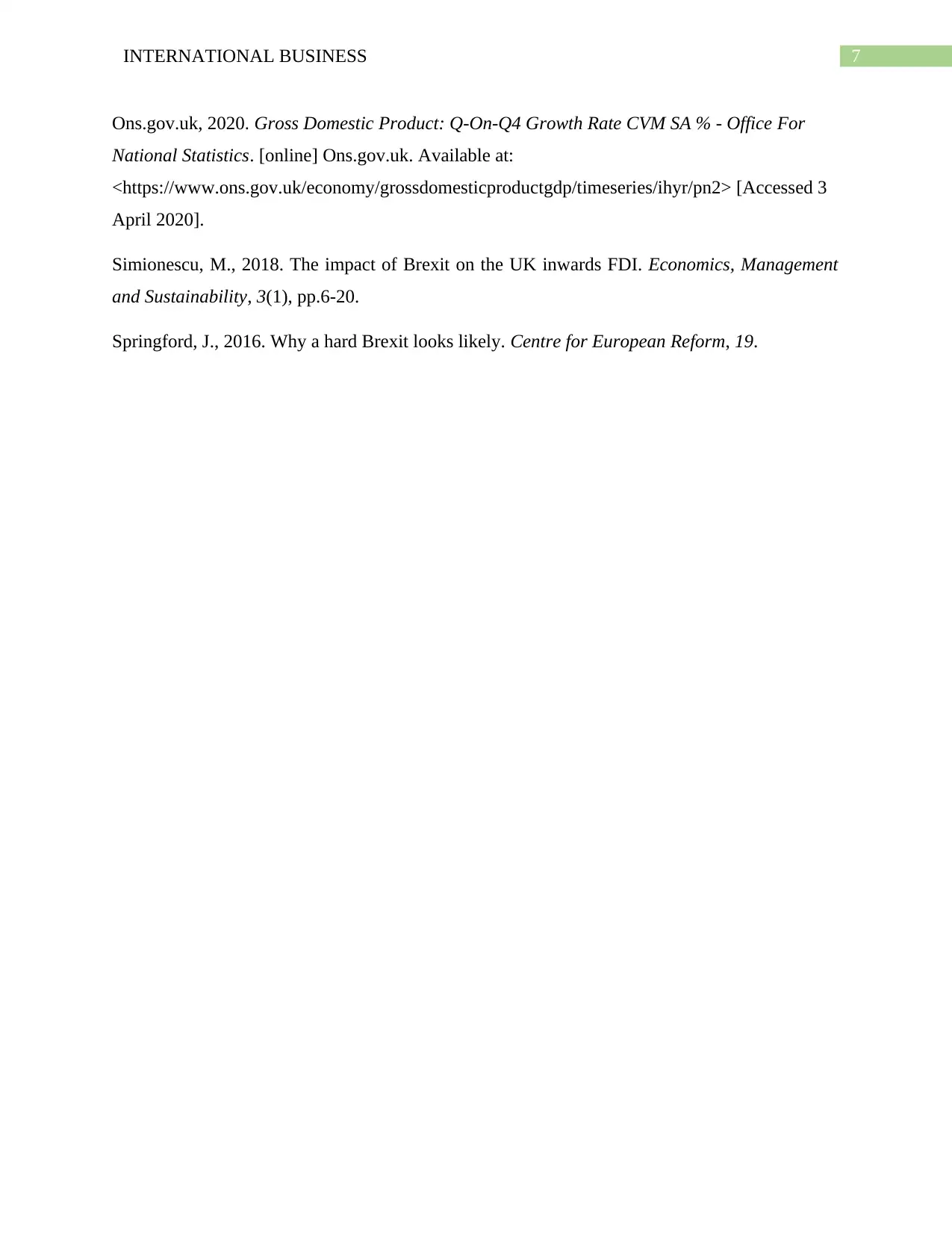
7INTERNATIONAL BUSINESS
Ons.gov.uk, 2020. Gross Domestic Product: Q-On-Q4 Growth Rate CVM SA % - Office For
National Statistics. [online] Ons.gov.uk. Available at:
<https://www.ons.gov.uk/economy/grossdomesticproductgdp/timeseries/ihyr/pn2> [Accessed 3
April 2020].
Simionescu, M., 2018. The impact of Brexit on the UK inwards FDI. Economics, Management
and Sustainability, 3(1), pp.6-20.
Springford, J., 2016. Why a hard Brexit looks likely. Centre for European Reform, 19.
Ons.gov.uk, 2020. Gross Domestic Product: Q-On-Q4 Growth Rate CVM SA % - Office For
National Statistics. [online] Ons.gov.uk. Available at:
<https://www.ons.gov.uk/economy/grossdomesticproductgdp/timeseries/ihyr/pn2> [Accessed 3
April 2020].
Simionescu, M., 2018. The impact of Brexit on the UK inwards FDI. Economics, Management
and Sustainability, 3(1), pp.6-20.
Springford, J., 2016. Why a hard Brexit looks likely. Centre for European Reform, 19.
1 out of 8
Related Documents
Your All-in-One AI-Powered Toolkit for Academic Success.
+13062052269
info@desklib.com
Available 24*7 on WhatsApp / Email
![[object Object]](/_next/static/media/star-bottom.7253800d.svg)
Unlock your academic potential
Copyright © 2020–2025 A2Z Services. All Rights Reserved. Developed and managed by ZUCOL.




